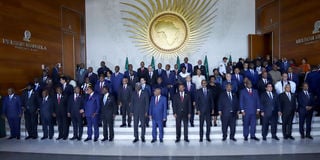President Ruto endorsed as African Union champion for institutional reforms

African heads of state pose for a group photo with African Union Commission Chairperson Moussa Faki Mahamat during the opening of the 37th Ordinary session of the Assembly of the Africa Union in Addis Ababa, Ethiopia February 17, 2024.
What you need to know:
- Dr Ruto has been leading Africa’s voice calling for a global finance revolution to drive climate investment.
- President Ruto said he was ready to lead the continent in advancing the international financial reform agenda.
President William Ruto has been endorsed as the new African Union Champion for Institutional Reforms.
The Assembly of African Union Heads of State and Government, meeting in Addis Ababa, Ethiopia, on Saturday, gave President Ruto the new responsibility of providing political leadership and vision and completing the Comprehensive Institutional Reform Initiative launched in 2016.
He takes over from President Paul Kagame of Rwanda.
In the new role, President Ruto will be involved in reforming the structure, functioning and focus of the African Union Commission, AU organs and specialised agencies to make them more effective and efficient in managing African Union programmes, according to a State House briefing.
Earlier at the Presidential Dialogue on Reform of Global Financial Institutions, President Ruto said he was ready to lead the continent in advancing the international financial reform agenda.
"In Paris, Nairobi, New York and Dubai, the messages from our continent have been consistent and Kenya remains fully focused on the subject," Dr Ruto said.
He observed that Africa was co-leading both the Taskforce on International Taxation to Scale up Development, Climate and Nature Action (the Taskforce) and the Expert Review on Debt, Nature and Climate.
"We have high ambitions in both – and the negotiations on the terms of reference and the setup have made clear that there are real changes at stake here. It was tough negotiations between our teams and those from the developed world to agree on what should be the focus and how,” said Dr Ruto.
He added: “We hope that an expanded and innovative toolkit to deal with Africa’s sovereign debt burden will not only include instruments such as debt pause clauses and debt for nature swaps but also appropriately differentiated treatment of debt incurred to finance green economic growth.”
He called for more investments in renewable energy generation capacity saying “Green is not only more future-proof but even cheaper.”
“Optimising investment in green growth will require innovation, it needs to be structured so that the business case to invest in green alternatives is maintained and where possible strengthened. And it needs to recognise and feed into discussions about trade and market access.”
However, he warned that if Africa is penalised for high upfront investment through an impact on our credit rating or with high-interest rates, it might become more economically rational to invest in fossil fuels to avoid a higher debt burden and a poorer debt rating.
He said 2024 and 2025 are crucial years to push the agenda.
“A high level of coordination among many different types of actors: bilateral creditors, private lenders, multilateral institutions and borrowing countries themselves is essential.”
He said there is a need to maximise Africa's membership in the G20 which is an important venue where such political consensus can be mustered.
He welcomed the launch of the Africa Club, the Alliance of African Multilateral Financial Institutions that will allow Africa to further inform international reform and to lead by example with regional collaboration.
Dr Ruto’s newest role did not come as a surprise as he has been on the frontline leading Africa’s voice calling for a global finance revolution to drive climate investment
While attending the United Nations General Assembly in New York last September President Ruto stressed the need for Africa to drive investment to help the continent’s countries address the green energy transition.
This, said Dr Ruto, was aimed at boosting the African continent's economies while also adapting to the extreme weather conditions.
Dr Ruto in his keynote address said there was an inaccurate perception that investments in African countries are risky, unfairly holding back the flow of funds needed.
Said President Ruto: “There is a need to rethink, to re-imagine, and to reconfigure the approach to financial markets.”
He added that African economies should be anchored on strong financial markets — such as credit rating agencies, sovereign debt analysis, and risk analysis.
The inaugural Africa Climate Summit, which attracted 25 Heads of State in Nairobi in September 2023 and was spearheaded by President Ruto, crafted the Africa Climate Summit Nairobi Declaration which made a strong push for accelerated climate action and financing mechanisms in a new financing architecture responsive to Africa's needs including debt restructuring.
The Nairobi Declaration also proposed a new financing architecture that is responsive to Africa’s needs and the development of a new Global Climate Finance Charter through UNGA and COP processes by 2025.
President Ruto has also positioned himself as a climate advocate and has played a critical role in promoting a new financial framework to tackle global climate challenges during his visit to Paris hosted by President Emmanuel Macron in June 2023.
Heads of State and Government of the African Union are holding their 36th Ordinary Session in Addis Ababa.





